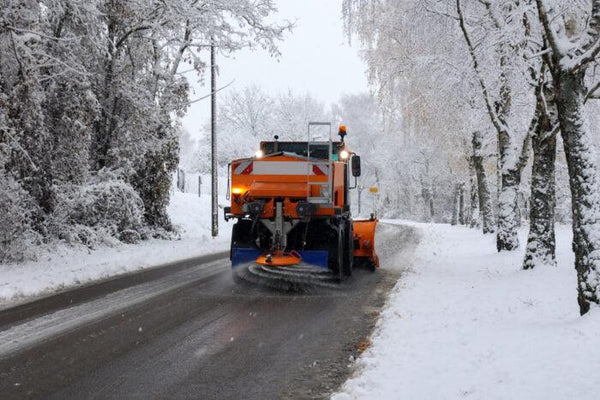The United Kingdom is one of the coldest regions in the world. The winters in this part of Europe are known worldwide for their bone-chilling temperatures. Extreme snowfall, frost, and late sunrise are a few characteristics of the region. In such a scenario, it becomes difficult to make peace with the outdoor conditions. For example, snow accumulating in driveways and roads is a major concern these days. But have you ever heard of de-icing salts? Did you know that it can do miracles for you in extreme winters? Here is a guide article that will help you learn everything about deicing salts and their applications.
What is Deicing Salts?

Deicing salts, often known as halite or brown rock salt in general, comprise sodium chloride. Yes, it is the same chemical that is used while cooking to enhance the flavour of your food. You got it right. We are talking about table salt, which has a slightly different composition. Along with food, halite salts can also be used to clean snow from the road.
Appeal and Composition
Deicing salt, which contains 94% sodium chloride, is reddish-brown in colour. The salt's red colour is due to the presence of marl in it.
How is Deicing Salt Made?
Since the beginning, Deicing Salt or grit salts have come from the drying of the prehistoric oceans. In the UK, deicing salt is sourced mainly from two sources: Cleveland, near Winsford in Cheshire, and County Antrim, Northern Ireland.
Working Mechanism
You might wonder how salt used for cooking food can remove snow from the surface. Well, here is the working mechanism of deicing salt that will help you understand the procedure. The grit salt for driveways works by lowering the freezing point of the water. The process is known as "freezing point depression." And it makes ice melt at lower temperatures than usual. When you sprinkle the salt on the surface, it dissolves and releases sodium and chloride ions. The chemical ions then disrupt the bonds between water molecules and allow the snow to meth from the road surface.
How Winter Troubles the Driveways in the UK
In the UK, winters are quite unpredictable. Certain days can be marked by ice storms and snow falls that frequently drop the temperature below freezing, making the weather prone to health risks and road accidents. The first reason is that freezing temperatures can cause health risks. In the same way, ice and snow on the road surface can create a slippery driveway. Riding or driving on such slippery surfaces can pose risks of serious slips and falls that may even result in fatal accidents. In simple terms, it can be difficult for homeowners and their families, especially kids who keep running from one place to another. Even when you are just parking the vehicle, there's a high chance that your car might skid, resulting in mishappenings.
How To Apply Deicing Salt on the Surface?

The application of deicing salt is quite simple. You can even do it yourself without asking for expert help from any professional. All you have to do is:
- Spread a uniform layer of salt on the icy surface.
- Once you apply the salt, the ice will start to melt, dissolving the thin layer of water on the icy surface.
- The brine solution lowers the water's freezing point, causing ice to melt before it reaches the required temperature.
- As soon as the ice melts, you can clean the driveway by sweeping the excess salt from it.
- Also, your driveway and road are safe to use for driving and playing.
What are the Benefits of Using Deicing Salt?
Using the deicing salt can offer you multiple advantages, such as:
- The primary benefit of using deicing salt is improved safety. By removing the ice, the slipperiness on the floor is reduced. It prevents the risks of accidental injuries.
- The next thing is that a non-slippery surface will allow drivers to have greater control of the vehicle while driving or parking.
- Further, deicing is cheaper than other alternatives, making the place safer and more accessible.
- The best part is that deicing is a simple procedure. You can do it yourself without the assistance of professional experts.
Are There Any Alternatives for Deicing Salt?
You can also use other alternatives, such as sand, magnesium chloride, calcium chloride, and urea, in addition to deicing salt. However, it's best to use grit salt, as it has a lesser impact on the environment.
Is There Any Environmental Impact of Deicing?
Going against nature obviously impacts the environment in a certain way. But when you use the deicing salt responsibly, you need not worry about anything. For the best results, it is advised to consult a professional expert beforehand. Also, use a small quantity of salt as required; don't overuse it.
In other words, deicing using grit or salt can impact the vegetation of the local region. Certain species are highly affected by the use of common salts. It can also cause soil and water contamination. Further, salt contains chlorides, which also contribute to metal corrosion that affects the local wildlife. In case you are using deicing salts on the metal surface, ensure that you don't allow it to sit for a long time. Leaving deicing salt for too long can affect the pristine shine of the metal surface. As soon as your work is done, clean the surface without allowing it to accumulate on the surface.
Source Premium Quality Deicing Salt From Brisks
Are you based in the UK and looking to find premium-quality grit salt or deicing salt for your driveways, pathways, or private roads? We know that it can be tough to find a reliable brand that promises the best in the market. But your answer is Brisks. At Brisks, you can find everything you need to enhance your gardens and outdoor spaces. Whether you want gravel, garden aggregates, or garden soil, we have everything for you.
A Way Forward
Deicing salt is the quickest and most effortless way to manage icy driveways during the UK winter. The melting ice reduces the slipperiness on the floor, which enhances the safety of drivers and family members. The best part is that deicing salt has a minimal impact on the environment. Thus, you can enjoy safe driveways throughout the extreme winter period.

